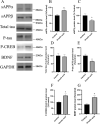Long term administration of loquat leaves and their major component, ursolic acid, attenuated endogenous amyloid-β burden and memory impairment
- PMID: 37798424
- PMCID: PMC10556093
- DOI: 10.1038/s41598-023-44098-3
Long term administration of loquat leaves and their major component, ursolic acid, attenuated endogenous amyloid-β burden and memory impairment
Abstract
Loquat (Eriobotrya japonica) leaves contain many bioactive components such as ursolic acid (UA) and amygdalin. We investigated the effects of loquat leaf powder and methanol extract in human neuroglioma H4 cells stably expressing the Swedish-type APP695 (APPNL-H4 cells) and C57BL/6 J mice. Surprisingly, the extract greatly enhanced cellular amyloid-beta peptide (Aβ) 42 productions in APPNL-H4 cells. Administration of leaf powder increased Aβ42 levels after 3 months and decreased levels after 12 months compared to control mice. Leaf powder had no effect on working memory after 3 months, but improved working memory after 12 months. Administration of UA decreased Aβ42 and P-tau levels and improved working memory after 12 months, similar to the administration of leave powder for 12 months. Amygdalin enhanced cellular Aβ42 production in APPNL-H4 cells, which was the same as the extract. Three-month administration of amygdalin increased Aβ42 levels slightly but did not significantly increase them, which is similar to the trend observed with the administration of leaf powder for 3 months. UA was likely the main compound contained in loquat leaves responsible for the decrease in intracerebral Aβ42 and P-tau levels. Also, amygdalin might be one of the compounds responsible for the transiently increased intracerebral Aβ42 levels.
© 2023. Springer Nature Limited.
Conflict of interest statement
The authors declare no competing interests.
Figures





Similar articles
-
Determination of oleanolic acid, ursolic acid and amygdalin in the flower of Eriobotrya japonica Lindl. by HPLC.Biomed Chromatogr. 2007 Jul;21(7):755-61. doi: 10.1002/bmc.817. Biomed Chromatogr. 2007. PMID: 17385800
-
Inhibitory effects of the leaves of loquat (Eriobotrya japonica) on bone mineral density loss in ovariectomized mice and osteoclast differentiation.J Agric Food Chem. 2014 Jan 29;62(4):836-41. doi: 10.1021/jf402735u. Epub 2014 Jan 15. J Agric Food Chem. 2014. PMID: 24404864
-
The Potential of Triterpenoids from Loquat Leaves (Eriobotrya japonica) for Prevention and Treatment of Skin Disorder.Int J Mol Sci. 2017 May 11;18(5):1030. doi: 10.3390/ijms18051030. Int J Mol Sci. 2017. PMID: 28492484 Free PMC article.
-
Quantification of amygdalin, prunasin, total cyanide and free cyanide in powdered loquat seeds.Food Addit Contam Part A Chem Anal Control Expo Risk Assess. 2020 Sep;37(9):1503-1509. doi: 10.1080/19440049.2020.1778186. Epub 2020 Jul 3. Food Addit Contam Part A Chem Anal Control Expo Risk Assess. 2020. PMID: 32618500
-
Biological Activities of Extracts from Loquat (Eriobotrya japonica Lindl.): A Review.Int J Mol Sci. 2016 Dec 6;17(12):1983. doi: 10.3390/ijms17121983. Int J Mol Sci. 2016. PMID: 27929430 Free PMC article. Review.
Cited by
-
A Direct Relationship Between 'Blood Stasis' and Fibrinaloid Microclots in Chronic, Inflammatory, and Vascular Diseases, and Some Traditional Natural Products Approaches to Treatment.Pharmaceuticals (Basel). 2025 May 12;18(5):712. doi: 10.3390/ph18050712. Pharmaceuticals (Basel). 2025. PMID: 40430532 Free PMC article. Review.
References
Publication types
MeSH terms
Substances
LinkOut - more resources
Full Text Sources

